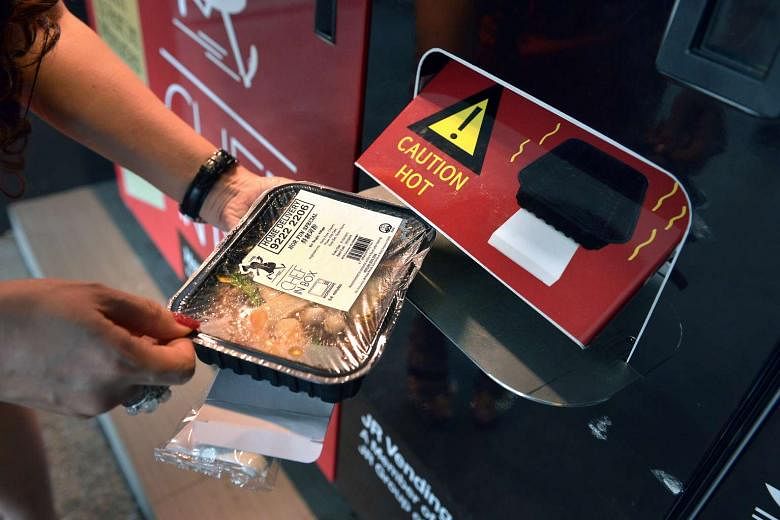You might have seen vending machines that dispense hot hawker dishes like nasi briyani or hor fun.
Soon, there might be more of such vending machines or kiosks offering ready-to-eat meals here, if a government plan to make the food service sector leaner takes off.
Enterprise development agency Spring Singapore will help companies with innovative dining ideas try out these concepts in commercial and residential areas, under the second Food Services Productivity Plan announced by Minister for Trade and Industry (Trade) Lim Hng Kiang yesterday.
The Singapore Productivity Centre (SPC) will also conduct training and workshops for companies that want to raise productivity but do not know how.
The five-year plan will focus on promoting manpower-lean dining formats like vending machines and ready-to-eat meals, while encouraging food & beverage companies to be more efficient and productive by using technology and automation.
The food service sector is heavily reliant on manpower for jobs such as cooks, waiters, cashiers and dishwashers.
From 2004 to last year, the sector's workforce grew 8.5 per cent annually, slightly more than double that of the national workforce growth.
"The labour market will continue to tighten and evolve. This reliance on manpower, especially on rank-and-file workers, is just not tenable," Mr Lim told more than 200 industry players at a conference organised by the SPC at One Farrer Hotel & Spa.
For companies to remain sustainable over the long term, they should look at new ways to prepare and serve food, he added.
A typical vending machine can hold 80 to 120 meals, similar to what a coffee-shop stall sells in a day. But it requires a fraction of the manpower to run, and can operate round the clock in a much smaller space, he noted.
He also encouraged firms to adopt mobile apps, self-ordering and self-payment kiosks and tablet ordering systems.
More than 600 establishments now do so, with about half of them having come on board in the first five months of this year.
One restaurant that plans to increase productivity is the Soup Spoon's upcoming outlet in Nanyang Technological University. Its customers will have to self-collect their meals and cutlery.
This will allow its cashiers to move on to the next customer 20 seconds faster, said the chain's executive director Anna Lim.
Prices will also be slightly lower than those of its other outlets. "We want to pass on the savings to customers, to encourage this (self-service) kind of behaviour," she said.
Ms Jocelyn Chng, chief executive of JR Vending which has nearly 100 vending machines offering hot meals islandwide, said more can be done to get consumers to accept alternative dining concepts.
Some of her machines are placed next to cafes in schools, to serve students even after the cafes have closed for the day. "My staff can't be there all the time but the machines can," she said. "But demand is just not there yet."


